Users are cautioned that
(i) Most Argo Data Assembly Centers (DACs) have not yet corrected APEX profile data for the drift of pressure sensors in real-time (RT) and delayed-mode (DM) files. Steps are being taken by the DACs to apply drift corrections in both RT and DM files. It is estimated the correction will change affected APEX float pressures by an array average of about -2 dbar in 2003 data, decreasing to about 0 dbar in 2008 (due to improved sensor stability). However, a few older individual floats may have profiles with pressure offsets of over 10db.
(ii) APEX floats with APF8 controller boards, unless they include a specific recent update to their firmware, truncate any negative surface pressure drifts (TNPD) to zero – and thus these floats, if their pressures drift towards negative values, have unknown pressure bias and are uncorrectable. Floats with Druck pressure sensors (mostly deployed in 2004 and later) are known to have small drift (< 1 dbar), except for a very small percentage subject to a sensor malfunction that causes large negative drifts of several tens of decibars. It is thought that the malfunctioning (large TNPD) instruments can be identified and greylisted, making the majority of TNPD instruments usable.
Until the above corrective actions are taken, users are advised to assess the impact of uncorrected data on their applications, and if necessary either wait for corrected data or apply corrections to the unadjusted pressure data based on surface pressure values stored in the float technical files. “Uncorrectable” floats may be excluded from applications requiring highest quality data.
Lists of WMO IDs of “uncorrectable” floats (due to insufficient surface pressure data, truncated negative surface pressure drift, no technical file available, unknown float type) can be found at http://www.marine.csiro.au/~cow074/quota/argo_offsets.htm. Some floats will be removed from these “uncorrectable” lists when updated metafiles and technical files are provided by Argo DACs.
Although the majority of pressure drift corrections are small (i.e. their net effect is less than the pressure sensor’s error specification), the Argo Program is committed to identifying and carefully removing systematic errors that may impact applications including global change research. Ultimately, Argo data quality rests not only on the accuracy and stability of the sensors, but also on the existence and availability of high-quality shipboard CTD data used as a secondary standard for assessing Argo data. The process of evaluating and improving Argo data quality is a multi-year one, exceeding the one-year typical timescale of Argo’s delayed-mode quality control process. Argo data quality is itself a research effort of highest importance.
Further information will be posted on this site as available.
Specific questions may be directed to support@argo.net.
